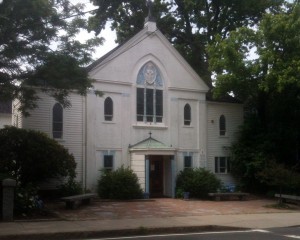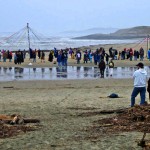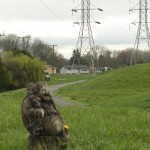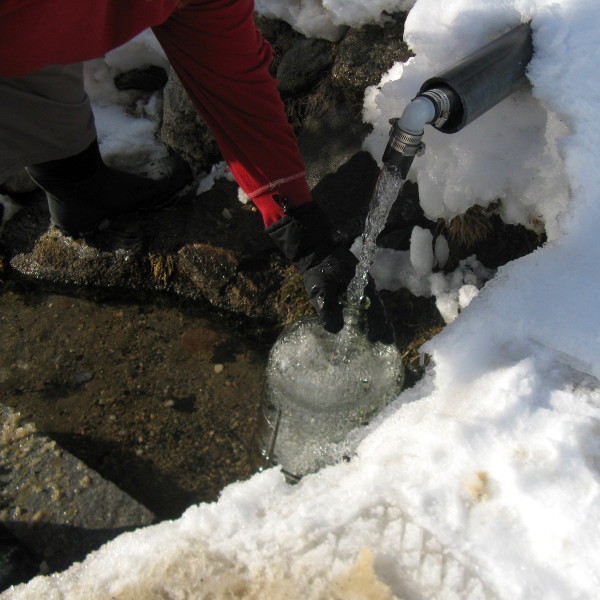 I saw my first Beltaine fire in a Paschal flame.
I saw my first Beltaine fire in a Paschal flame.
Eighteen years ago now, I think, though I do not trust my own accounting. My friends had returned home to family but I remained, for my family was far away and I wanted, instead, to wander the long rock outcroppings and listen to the sea.
I went for a time to a Christian college in Cape Ann, Massachusetts. This is not that story, for there is little to tell: a young, awkward, secretly gay guy, raised in abject poverty, given a massive scholarship to a Christian college until he admits he’s gay. What else is there to know?
Actually, you should know the priest, and the small church on the coast, the waves crashing against rocks, the moon looming huge over the sea. That’s a story in itself.
I.
It was Holy Week. I took a train from the campus to Rockport to celebrate, because I didn’t know what else to do, and I also didn’t know why, and I didn’t feel like I belonged anywhere. My life is often like this.
Months before I’d been brought by an anglophile friend to the church, a tiny, left-leaning Episcopal parish headed by a female priest. It was all so much sacrilege that it was terrifying delicious: sometimes there were feminine pronouns for the divine, the Bishop was a chain-smoker, and they used real wine (Port, if I recall) for Communion. I’d been a Southern Baptist most of my tumultuous adolescence, and hadn’t even smelled incense before. It was all so heretical, but I had my own terrifying heresy.
Incense almost turned me into a Pagan, but another thing has that honor. I’d attended once, wondered if I’d go to hell just listening to a female priest, and then smelled it. Frankincense, Myrrh, Gum Benzoin burned upon charcoal in a brass thurible swung amongst us, briefly (I later learned, to avoid setting off smoke alarms), and then gone.
A few months later, and I was the guy swinging the incense, the thurifer (still one of my favorite words). I think my anglophile friend had asked on my behalf, and they’d agreed, and it smoked out a bit of that terrifying pain.
II.
I took the train to Cape Ann, because there was no one to drive me and I’ve never driven. I didn’t know what I was doing, only that I’d heard Holy Week was profound. At the beginning of Lent, I’d taken the sooty mark in a bit of awe, having read and re-read T.S. Eliot’s Ash Wednesday repeatedly because Eliot was pretty much all I had which was constant at that time, except for fear of being found out.
Will the veiled sister between the slender
Yew trees pray for those who offend her
And are terrified and cannot surrender
I’d fallen in love with my best (straight) friend. This happens often if you’re gay and terrified and it’s a bit worse if you’re also Evangelical and self-hating and so full of fear. And I couldn’t tell him because I couldn’t tell myself. I think I’d given up “gay thoughts” for Lent, but that hadn’t worked, and it was made a bit more complicated by the day the priest(ess) invited me into her office.
III.
“You have something to tell me,” she’d said. “Something you really want to tell someone but haven’t been able to yet.”
You haven’t met me, probably. I have a strange problem—I don’t present as “gay.” My voice is deep, my manners oafish. All the gay money and fashion sense and flamboyance (all problematically stereotypical) passed me by; I blend in with “straights” too well without trying, and often have to declare my sexuality in order to be recognized as a man-lover.
So I don’t know how she figured it out.
“I’m gay,” I’d said, otherwise dumbfounded.
“Good. You feel better saying that?”
I found I did.
IV.
The liturgy on Maundy Thursday is plain, restrained. It’s Good Friday where they extinguish the light, the flame that’d been kept lit all year, that’d hung suspended over the altar. In the stories, the light of the world goes out, and in the Chapel, the flame is gone.
The world was in darkness, and I felt it. I felt myself the darkness. The darkness of being gay, alone, scared, admitting everything I’d believed beforehand was only borrowed meaning. I do not know if I was more alone or more terrified. But this is a futile question.
I kept vigil with a few others through the weekend, sleeping overnight in a pew, lighting sticks of incense and candles at the back of the chapel, more incense than was needed but the women I waited with seemed to understand my desire for it.
During the day, I’d wander Cape Ann. T.S. Eliot wrote about the area in his Four Quartets. The third is called The Dry Salvages, named after rocks just off the coast of Cape Ann, and the language feels like the sea. I read it repeatedly, went out to see them, wondering at so much pain and how the ocean seemed to want to swallow it all.
Time the destroyer is time the preserver,
Like…the ragged rock in the restless waters,
Waves wash over it, fogs conceal it;
In navigable weather it is always a seamark
To lay a course by: but in the somber season
Or the sudden fury, is what it always was.
V.
I’d heard of Brigit of Kildare there in that chapel, and had known the stories of St. Patrick lighting the Beltaine fire before the Druids, but it wasn’t until Mother Wade set out the brazier to light the Paschal flame that I understood something.
I think I asked her, but maybe I didn’t. I’d mentioned the Beltaine fires, and the timing, and the tradition where this flame would spread throughout the chapel and light the flame within the church for the rest of year, and I wondered aloud about the coincidence, and I think she nodded. I think I cried, and not because there was too much incense smoke in my eyes.
I don’t know why I am thinking on this now, nearly two decades later. That place, asleep on wooden benches while keeping vigil, waiting for the return of someone I didn’t really believe in any longer. The rocks along the shore had been sharp, I’m pretty certain I’d lost a sock, and I’d been hungry from the fasting.
But there, far away from where I am now, I saw my first Beltaine fire. It is a very long journey from Southern Baptist to Pagan, but I’d found a side-path through a small Episcopal chapel. The light returned (though it was never gone), my life changed, and the bells in the hands of every person there, shaking and clanging and chiming to announce that return seemed almost to declare my own birth, or at least of my own light.












